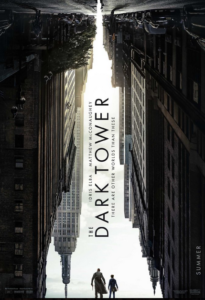
 “The Dark Tower” made me want to read the source material, because there is no way that Stephen King’s eight novel multiverse is as simplistically written as this film adaptation. Credited to four screenwriters, “The Dark Tower” movie is efficient but not engaging. It feels very much like a TV pilot, which is exactly what is coming next.
“The Dark Tower” made me want to read the source material, because there is no way that Stephen King’s eight novel multiverse is as simplistically written as this film adaptation. Credited to four screenwriters, “The Dark Tower” movie is efficient but not engaging. It feels very much like a TV pilot, which is exactly what is coming next.
In the breezy film version of the massive King property, a sorcerer named the Man in Black (Matthew McConaughey) searches for a child that has something called the “shine,” which is telekinetic or telepathic power. His hope is that a child or a combination of them will be strong enough to destroy the Dark Tower. And if that happens, monsters invade and take over the universe. Standing in his way is Roland Deschain (Idris Elba), the last of a long line of gunslingers, who have descended from the knights of old. Instead of a sword, the gunslingers make expert use of a sixgun to take on the forces of evil.
Meanwhile in New York City, a teen boy named Jake Chambers (Tom Taylor) struggles to understand the dark visions and dreams he’s been having since the death of his firefighter father. A gifted artist, Jake sketches his dreams revealing the Man in Black and the gunslinger as well as the tower itself. In time, his dreams and visions will lead him to a portal into Roland’s world. Jake’s quest unites him with the troubled Roland and leads to an inevitable confrontation with the Man in Black.
“The Dark Tower” is in a hurry to end—rushing, rushing, rushing. Characters are quickly introduced without any background, and they are given a line or two of dialogue that merely advances the plot forward. Instead of conveying a sense of urgency, it feels like an extended trailer or the CliffsNotes version of a much better film or story. Lots of key material feels missing, a dearth of context that would make us care. The world introduced is truncated and does not look real. And without time spent to build the universe, the viewer tunes out.
Thematically, the film is flawed. Sure, it’s about good versus evil. But since the motivations of the Man in Black are murky, we cannot appreciate why stopping him matters. The unanswered questions are frustrating. Since, as I understand it, the movie departs greatly from King’s novels, even fans schooled in the eight novel mythology will likely be confused.
Perhaps the best thing that can be said about the film is that McConaughey is fun in his dark role. At times, he’s even a bit scary. But the film is so uneven that when the Man in Black does something truly awful, like killing someone close to Jake, it feels all wrong for the initial tone. This makes the emotional center of the movie seem trite and not real. Pay close attention to a scene in which the Man in Black appears in a kitchen. Perhaps as a comic wink or nod to the viewer, he’s wearing a black apron, a detail that I found weird to the point of absurdity.
And the false emotions on display aren’t helped by special effects that left me wanting. One scene has Roland and Jake fighting some kind of demon in a darkened forest. The images are so dark and fuzzy that the demon is impossible to fully identify. This scene made me wonder whether the production was hiding something. Later, fight sequences, clearly borrowed from the “Matrix,” felt like a poorly realized version of circa 1999 computer generated action set-pieces. This isn’t a movie to see for the effects or scenery. But, sadly, it isn’t worth seeing for the story either.
“The Dark Tower” isn’t really a mess—it’s just way too simplistically crafted. Everything takes place perfectly on cue. For example, when Roland and Jake happen upon a village looking for a “seer,” one immediately steps forth and tells them everything that they (and we) need to know. It all too easy lacking both imagination and mystery. And while context is missing to help us appreciate the depth of the world and the risks the characters are taking, the plot is advanced with boring precision often with remarkably helpful bits of clunky dialogue.
Stephen King, perhaps the greatest horror writer of all time, deserves better. Let’s hope that next month’s “It” reminds us how special a King film can be.

